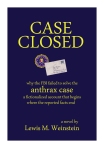* NAS Committee changes … Popham and Venkateswaran on; Driks off
Posted by DXer on September 23, 2009
 click here to … buy CASE CLOSED by Lew Weinstein
click here to … buy CASE CLOSED by Lew Weinstein
Here’s what readers say about CASE CLOSED …
“Lew’s story is a quick read. In July 2008 a physician employee of the United States Army Medical Research Institute of Infectious Diseases dies. The FBI immediately not only declares the death a suicide, but also announces that the doctor had been their prime suspect in the 2001 anthrax murders by mail. “I don’t @#$%ing think so!” says the director of the nation’s Defense intelligence Agency (DIA) and a covert investigation of the FBI itself begins.”
.
NAS Committee changes … Popham and Venkateswaran on; Driks off
Dr. David L. Popham
Virginia Polytechnic Institute and State University
Dr. David L. Popham is a professor in the Department of Biological Sciences at Virginia Tech. He teaches in the areas of microbial genetics and physiology. He directs a research program in the areas of bacterial endospore structure, content, germination, and resistance properties. Dr. Popham has a Ph.D. in microbiology from the University of California-Davis. He held postdoctoral research positions at the Institut de Biologie Physico-Chimique in Paris and at the University of Connecticut Health Science Center before joining the Virginia Tech faculty in 1996. He has over 20 years of experience in research on Bacillus subtilis cell wall synthesis, spore formation, and spore resistance properties. More recently his research has expanded into the content, structure, and germination of spores produced by Bacillus anthracis, Clostridium difficile, and Clostridium perfringens. Dr. Popham is a member of the editorial board of the Journal of Bacteriology and has served as an ad hoc member of six NIH grant review panels. In 2007, he served on the EPA Federal Insecticide, Fungicide, and Rodenticide Act Scientific Advisory Panel for the development of guidelines for the approval of sporicidal products.
Dr. Kasthuri Venkateswaran
California Institute of Technology
Dr. Kasthuri Venkateswaran is a senior research scientist at the California Institute of Technology’s Jet Propulsion Laboratory. Dr. Venkateswaran’s 32 years of research encompass marine, food and environmental microbiology. He has applied his research in molecular microbial analysis to better understand the ecological aspects of microbes, while conducting field studies in several extreme environments such as deep sea (2,500 m), pristine caves (3,000 m altitude), spacecraft (Mars Odyssey, Genesis, MER, Mars Express, Phoenix, MSL) assembly facility clean rooms (various NASA and European Space Agency facilities), as well as the space environment in Earth orbit (International Space Station). Of particular interest are microbe-environment interactions with emphasis on the environmental limits in which organisms can live. The results are used to model microbe-environment interactions with respect to microbial detection, and the technologies to rapidly monitor them without cultivation. The bioinformatics databases generated by Dr. Venkateswaran are extremely useful in the development of biosensors. Further, these models or information in databases are extrapolated to what is known about the spacecraft surfaces and enclosed habitats in an attempt to determine forward contamination as well as develop countermeasures (develop cleaning and sterilization technologies) to control the problematic microbial species. Specifically, his research into the analysis of clean room environments using state-of-the art molecular analysis coupled with nucleic acid and protein-based microarrays, will allow accurate interpretation of data and implementation of planetary protection policies of present missions, helping to set standards for future life-detection missions.
DXer said
Although I’m disappointed I don’t see anyone with experience at making aerosols, the two new panel members clearly are highly expert in their specialized fields. Dr. Popham, for example, co-authored with Dr. Driks on the analysis of the properties of spores of bt prepared at different temperatures. One military expert experienced at making aerosols once told me that this issue of temperature is important to understand.
Analysis of the properties of spores of Bacillus subtilis prepared at different temperatures
… , ME Gilmore, S Little, DL Popham, A Driks, P … – Journal of Applied Microbiology, 2002 – interscience.wiley.com
… prepared at different temperatures E. Melly 1 , PC Genest 1 , ME Gilmore
2 , S. Little 3 , DL Popham 2 , A … E. MELLY, PC GENEST, ME GILMORE, S.
LITTLE, DL POPHAM, A. DRIKS AND P. SETLOW. 2002. Aims …